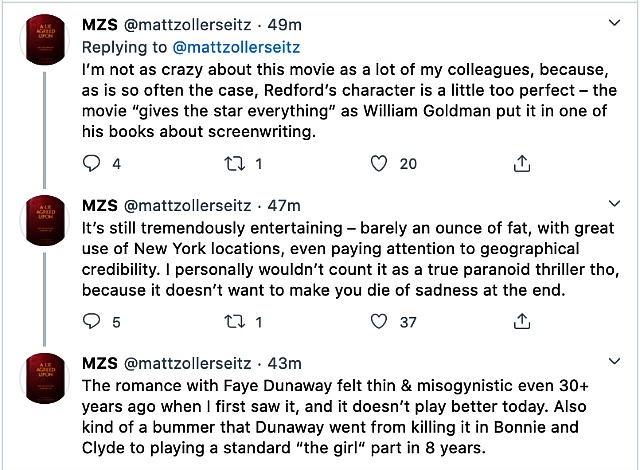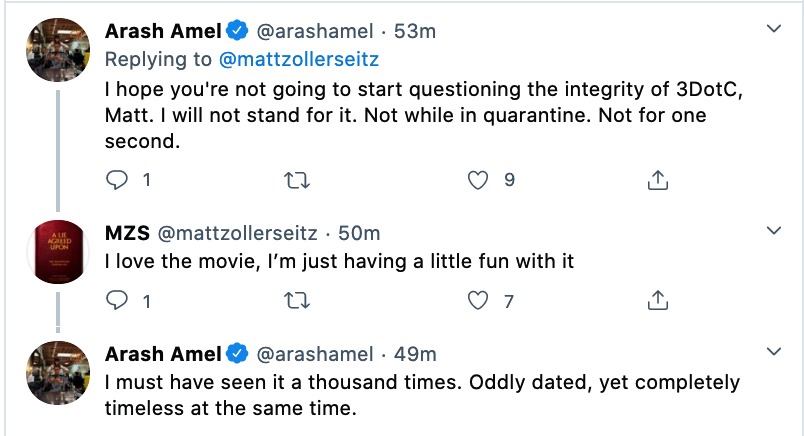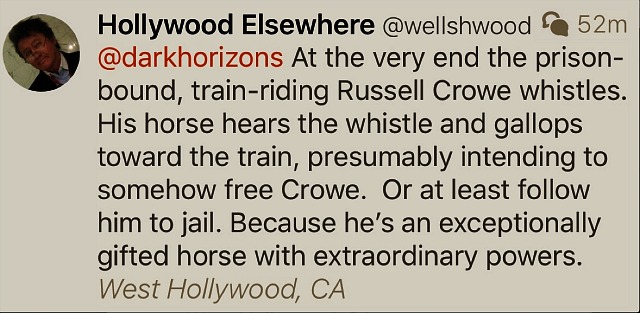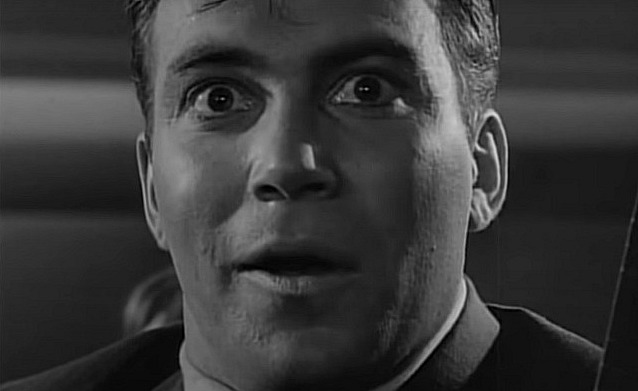Posted on 4.14, here’s a sologui remix of George Harrison‘s original 1969 demo with Nina Simone‘s 1972 version. You could argue that “Isn’t It A Pity?” is one of the most on-the-nose titles in history. There’s a whole community or genre of songs, films, plays and novels that follow the basic template by (a) describing or depicting some kind of tragedy or downish scenario of one kind or another and (b) asking “given how sad or awful things are, can’t we do better?” John Lennon‘s “Imagine” is another effort in this vein. The more artful song, film, play or novel bypasses the “can’t we do better?” part. Because it’s an unnecessary question. Simply presenting a bad/tragic situation is more than sufficient. One example of the latter kind (i.e., stark representation) is Cristian Mungiu‘s 4 Months, 3 Weeks, 2 Days. Mungiu just lays it out plain. Either you get it or you don’t.
 Jeffrey Wells
Jeffrey Wells
Luck of the Draw
I’ve been healthy for so many decades that I’ve never thought about it. Until lately, that is. Even though I’ve been careful I wonder each day if my luck will hold out. I’m probably not the only one who frets about this. Tomorrow is promised to no one, especially in these times. But man, what a feeling in the morning when I breathe deeply, taking that living-room air all the way down into the bronchi, bronchiole and alveoli, and I swear to God the lungs feel as clean as they did when I was ten, even though I smoked for 15 years or so. Famous last words, right?
Destructive Subservience
Posted yesterday by N.Y. Times columnist Charles Blow: “Donald Trump doesn’t care about being caught in a lie. Donald Trump doesn’t care about the truth.
“Donald Trump is a bare-knuckled politician with imperial impulses, falsely claiming that ‘when somebody’s the president of the U.S., the authority is total,’ encouraging protesters bristling about social distancing policies to ‘liberate’ swing states, and saying that Speaker Nancy Pelosi will be “overthrown, either by inside or out.”
“Trump has completely politicized this pandemic and the briefings have become a tool of that politicization. He is standing on top of nearly 40,000 dead bodies and using the media to distract attention away from them and instead brag about what a great job he’s done.
“In 2016, Trump stormed the castle by outwitting the media gatekeepers, exploiting their need for content and access, their intense hunger for ratings and clicks, their economic hardships and overconfidence.
“It’s all happening again. The media has learned nothing.”
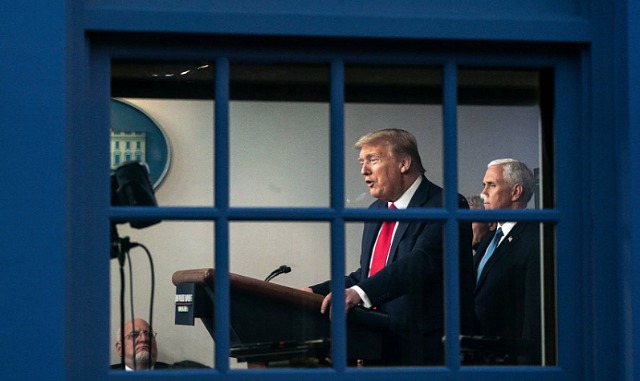
Sigh of Relief
A couple of months ago I expressed a reasonable concern that Criterion’s Great Escape Bluray (5.12) might be teal-ized. Now comes a review from DVD Beaver‘s Gary Tooze that says Criterion has gone for “yellowish, golden, sometimes green or earthy hues” — no teal whatsoever — and that it looks “brighter, shows more detail and depth and looks quite strong in-motion.”
Excerpt: “Make no mistake — with four teal-tinted disasters to their credit, a Criterion Bluray of a late 20th Century color film is now something to be feared. With Criterion having teal tinted four highly regarded classics (Teorema, Midnight Cowboy, Bull Durham, Sisters), I’m naturally dreading what might happen this time around.”
Here’s hoping that Criterion has abandoned the teal-tinting inclinations that all but destroyed their Blurays of the four above-mentioned titles.
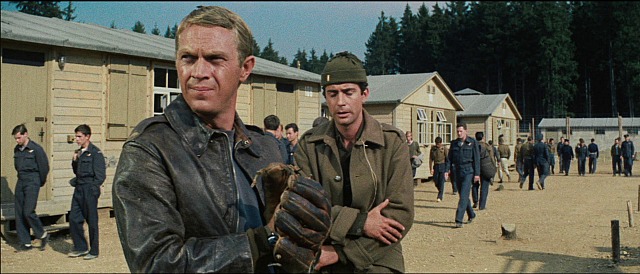
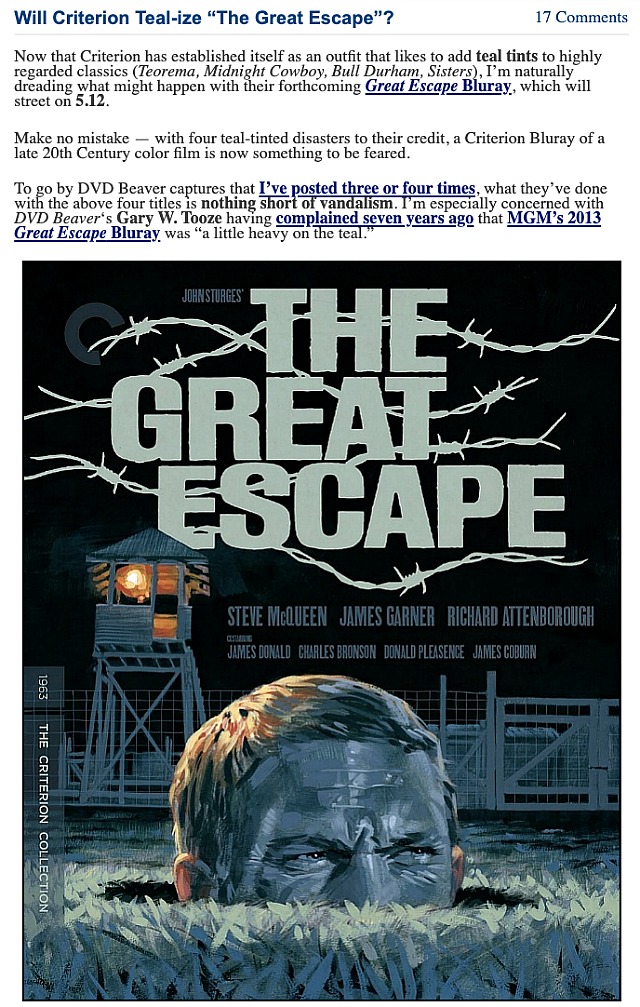
Elastic Ear Loops
Kyle MacLachlan praised this mask on Instagram this morning and I immediately concurred. It was designed and manufactured by “NYC cosplayer, bibliophibian and glitterwitch” rhaps0die“. The only problem is that the red ear straps aren’t looped or elastic — you have to tie them together. Once she works this out I’ll buy a couple, if she’s selling.

Breaks My Heart
For months I’ve been pining to see The Many Saints of Newark, otherwise known as the Sopranos prequel. It was going to open on 9.25.20, but now it’s been bumped to 3.12.21. I’m very sorry to hear this.
The early word was that Many Saints would deal with the 1967 Newark race riots. Although the film deals with racial relations, I’m hearing that the Newark riots are more of a backdrop than a plot element. What is it then? Basically a portrait of the culture that Tony Soprano came from and the seminal influences that ushered him into the life of a New Jersey crime boss. I’m told it runs around around 115 minutes.
Set in Newark during the mid ’60s and early ’70s, it focuses on three characters who figure heavily in the Sopranos legend. Dickie Moltisanti (Alessandro Nivola), the father of Christopher Moltisanti. “Johnny Boy” Soprano (Jon Bernthal), the father of Tony Soprano and capo of the original Soprano crew who goes to jail in the mid ’60s and is released in ’71. And Livia Soprano (Vera Farmiga), Tony’s chilly and manipulative mother.

The somewhat lesser figure of Junior Soprano, brother of Johnny Boy, is played by Corey Stoll, and a pair of lookalike brothers are played by Ray Liotta. Significant secondary characters are played by Leslie Odom, Jr. and Michela De Rossi.
The late James Gandolfini played Tony Soprano in David Chase‘s legendary Sopranos series, which ran from ’99 through ’07. Michael Gandolfini, his 19 year-old son, plays Tony in the second half of The Many Saints of Newark.
I’m hearing that Michael is quite good at filling his father’s young shoes, and that he nails a lot of his dad’s mannerisms and way of talking, etc. Quite the connection.
A portion of “Down Neck,” an episode of the first season of The Sopranos, re-appears in The Many Saints of Newark. Particularly an incident in which young Tony hides in the trunk of his father’s car when his dad drives to an amusement park. Or so I’ve been told.
The word is that this is a good and interesting film, and that it has a lot of tasty period flavor and interesting character perceptions, and will strike chords among Sopranos fans.
Mercy Mercy
Conversation between HE and World of Reel‘s Jordan Ruimy, about an hour ago:
HE: A connected friend just assured me “there will definitely be an Oscar season…don’t worry about that.”
Ruimy: Okay, but Oscar eligibility rules will have to change.
HE: Allowing streaming-only features to compete, you mean?
Ruimy: And they’re going to have to have the year to end in late January or even mid February, just this one time. Because there are so many titles waiting to open. And then have the Oscars in March sometime.
HE: Plus Anne Thompson’s idea of the Oscar telecast being a kind of patriotic industry event…we can get moving again when the vaccine finally hits!…the ultimate Night of a Thousand Stars event…that makes sense.
Ruimy: Yeah, I liked Anne’s idea, but we should still give out awards for the usual categories. If we’re still in lockdown by fall then at least make it fun for movie fans and allow streaming movies to be eligible.
HE: No lockdowns after August…please!
Ruimy: Yeah, but we don’t even know how next week will look in the country. Movie theatres may still be closed by fall, don’t you think?
HE: We’re already looking at theatres closed through most of the summer. Three and a half, four months. Now you’re talking five, six months? C’mon!
Ruimy: Movie theatre are confined spaces. If someone who has COVID coughs then the people around him/her are virus toast.
HE: I just want those Open Up zombies to start experiencing their own medicine, if you catch my drift.
Ruimy: These teabag protests are going to be growing more and more every week. It’s going to become its own kind of pandemic. Especially with Trump fanning the flames. It’ll leak through all 50 states.
HE: Blue state liberals are going to defy the lockdown?
Ruimy: Bumblefucks will rise up everywhere. Fox News and other conservative media are now full-on promoting a lift to the lockdown to help prevent the destruction of Trump’s booming economy. People who have lost their jobs, businesses and those who were surviving from paycheck to paycheck will all be part of these protests. It doesn’t mean that what they’re doing is right but they’re really desperate right now. A Great Depression is coming if this continues for even another month.
Hollywood As It Wasn’t
Ryan Murphy and Ian Brennan‘s Hollywood (Netflix, 5.1) recreates and reimagines late ’40s and ’50s Hollywood. Talented and dynamic women, gay guys and people of color occupying significant slots in the power structure. And with gay guys not as closeted as they actually were, and one couple openly holding hands in one snippet.
But of course, re-thinking America’s ethnic and sexual history has been in fashion since Hamilton, or over the last five years. Not exactly a radical move in 2020.
The problem is that nobody looks or sounds like a charismatic presence. They look and sound like attractive actors trying to inhabit that realm. The guy playing Rock Hudson, Jake Picking, doesn’t begin to exude the same kind of charisma.
Hollywood exec producer Janet Mock: “We turned to the past for direction, uncovering buried history to spin an aspirational tale of what ifs: What if a band of outsiders were given a chance to tell their own story? What if the person with greenlight power was a woman? The screenwriter a black man? What if the heroine was a woman of color? The matinee idol openly gay? And what if they were all invited into the room where the decisions are made, entering fully and unapologetically themselves to leave victorious and vaunted, their place in history cemented.”
Nightmare Over Lansing
Hats off to “HotPockets4All” for the primary image — I added the Shatner CU.
The theoretical essence of the Open Up tea-bag movement (please correct me if I have it wrong) is something along the lines of “better to risk death or even die (while helping others to do same) than submit to a severely shuttered, economically smothered way of life that amounts to a kind of living death.”
Is that more or less it? Because it feels like a plot element from The Omega Man.
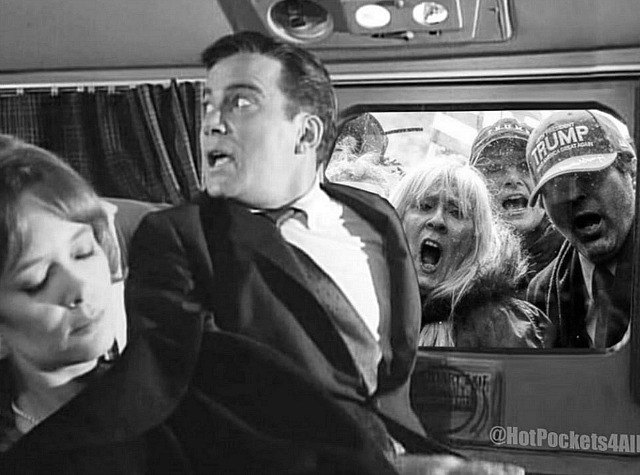
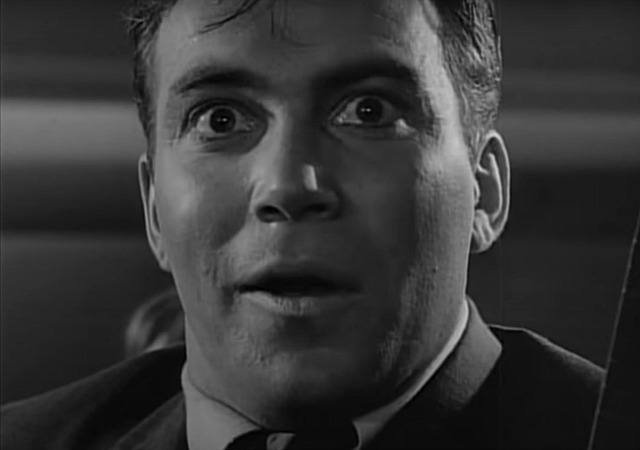
Fall of Ray Milland
For decades the consensus has been that The Thing With Two Heads (’72) is a mild hoot and worth seeing at least once. I’ve never had the slightest urge (my favorite Ray Milland-Roger Corman collaborations are The Man With The X-Ray Eyes and The Premature Burial) but now I’m thinking about it. The current winter of our discontent allows all sorts of bats into the belfry.
The problem if that it’s apparently not streamable and paying 20-plus for a DVD (not even a Bluray?) is a bridge too far.
More or less based on Stanley Kramer‘s The Defiant Ones (’58), the majority view is that TTWTH wasn’t funny or creepy enough. The director was Lee Frost. The screenwriters were Frost, Wes Bishop and James Gordon White.

